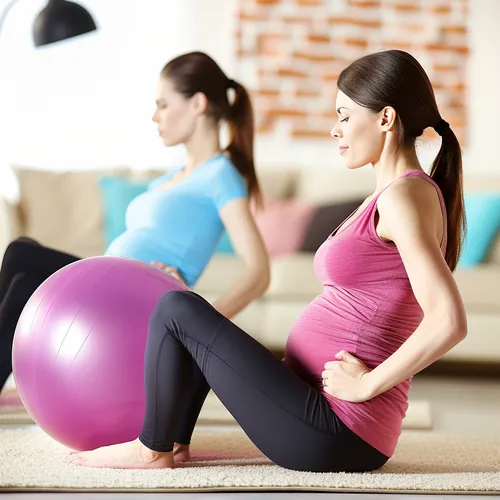When you’re pregnant you’re probably going to feel more tired than usual, so many women use their pregnancy as an opportunity to sit back, relax, and enjoy this special time. So, is that the right thing for pregnant women to do? Enjoying those precious months of pregnancy is definitely a plus; however, research shows that exercising during pregnancy is also very beneficial for both mother and baby.
A new study carried out by a doctoral student at Washington State University discovered that children’s metabolic health was greatly benefited when their mothers exercised while pregnant. Jun Seok Son said that whether women had diabetes or were obese, the lack of exercise in healthy pregnant women can leave children predisposed to obesity and other metabolic diseases later in life.
Dr Daghni Rajasingam from the Royal College of Obstetricians and Gynaecologists said there are many positive benefits for women who exercise during pregnancy. These include improving mood and sleep, weight maintenance, reducing high blood pressure, and helping to cope with labour.
Research shows that as many as three-quarters of healthy pregnant women are not exercising enough. Besides the many advantages of exercising while pregnant, women need to understand that responsible exercising won’t harm them or their baby. In fact, being active and exercising on a regular basis can help to –
- Maintain a healthy weight;
- Get a better night’s sleep;
- Assist with pregnancy issues like fatigue, constipation, pelvic girdle pain, bloating and swelling, and backache;
- Improve self-esteem and reduce, or even prevent, depression during pregnancy;
- Help prevent complications like pre-eclampsia;
- Promote muscle tone, endurance, and strength;
- Reduce the amount of time spent in labour;
- Regular exercise during pregnancy can also assist in managing blood sugar levels for women who develop diabetes during pregnancy.
How Much Exercise Should I Do?
Dr Rajasingam recommended a minimum of 150 minutes per week of exercise throughout the pregnancy. The exercise should be of moderate intensity and be completed in bouts of at least 10 minutes. Of course, this depends on the fitness level and comfort of the mother-to-be. Dr Rajasingam also recommended that women with health conditions seek medical advice prior to commencing any fitness program.
In addition to the recommended 150 minutes of moderate-intensity exercise per week, it is important for pregnant women to listen to their bodies and adjust their exercise routine accordingly. Some women may find that they are able to continue with their usual exercise routine, while others may need to modify or switch to lower impact activities.
Activities that are generally safe and beneficial during pregnancy include walking, swimming, stationary biking, prenatal yoga or Pilates, and low-impact aerobics. These activities help strengthen the muscles, improve cardiovascular health, and reduce the risk of gestational diabetes, high blood pressure, and excessive weight gain.
It is also important for pregnant women to pay attention to warning signs during exercise. If experiencing any of the following symptoms, it is essential to stop exercising and seek medical advice:
- Vaginal bleeding or fluid leakage
- Dizziness or feeling faint
- Shortness of breath or difficulty breathing
- Chest pain or rapid heartbeat
- Severe headache
- Muscle weakness or calf pain
- Decreased foetal movement
Additionally, pregnant women should avoid exercises that involve lying flat on their back or activities that carry a high risk of falling or abdominal trauma, such as contact sports or skiing.
It is important to remember that every woman and every pregnancy is unique, so it is crucial to consult with a healthcare professional before starting or continuing any exercise program during pregnancy. They can provide personalised advice and guidance based on individual health and circumstances.
In conclusion, maintaining a regular exercise routine during pregnancy can have numerous benefits for both the mother and baby.
The Importance Of Proper Nutrition During Pregnancy
In addition to regular exercise, proper nutrition is crucial for a healthy pregnancy. Eating a balanced diet rich in fruits, vegetables, whole grains, lean proteins, and healthy fats can provide the essential nutrients needed for foetal development. It’s also important to stay hydrated by drinking plenty of water throughout the day.
Pregnant women should aim to consume an additional 340-450 calories per day during the second and third trimesters to support the growth of the baby. However, this doesn’t mean indulging in unhealthy foods or “eating for two.” Instead, focus on nutrient-dense options and listen to your body’s hunger cues.
Certain nutrients, such as folic acid, iron, and calcium, are particularly important during pregnancy. Prenatal vitamins can help fill any nutritional gaps, but it’s best to consult with your healthcare provider to determine the right supplement for your needs.
By combining a nutritious diet with regular exercise, you can set the foundation for a healthy pregnancy and give your baby the best possible start in life.
It is recommended to aim for at least 150 minutes of moderate-intensity exercise per week, but it is essential to listen to your body, make modifications as needed, and seek medical advice if you have any underlying health conditions. By staying active and taking care of your body, you can have a healthier and more comfortable pregnancy.
Four Big Points To Consider
The Following 4 Points Should Be Considered When Choosing an Exercise Program While Pregnant
No. 1: Listen To What Your Body Is Telling You
According to Helen at Zoom Baby, women should maintain their normal daily activity for as long into their pregnancy as they can, provided that they’re comfortable doing so. And that’s why listening to your body is so very important.
Dr Rajasingam agrees and advises that pregnant women should listen to what their body is telling them and only do what feels right. He added that exercises that leave the mother-to-be breathless must be avoided.
Also in agreement is personal trainer Charlie Launder from Bumps & Burpees, a website that supports and empowers women throughout their pregnancy. Launder said that taking breaks and rest days is vitally important, adding that pregnant women must accept that they may not be able to push themselves as hard as they could before.
No. 2: Exercises Must Be Low-Impact
When expecting a baby, it is important to stay physically active during pregnancy in order to maintain a healthy weight, manage stress, and prevent or treat common discomforts such as back pain and fatigue. However, it is also important to stay safe when exercising, since the body is going through major changes during this time. Low-impact exercises are ideal for pregnant women, as these exercises minimise the risk of physical injury or stress to the body.
Low-impact exercises include activities such as walking, swimming, and yoga. These activities are gentle on the body and do not involve any jerky or jarring motions. Swimming is especially beneficial for pregnant women, as the water’s buoyancy helps to support the body’s weight, easing the strain on the joints and muscles. Yoga can also provide great relief from physical discomfort and can be tailored to fit any activity level.
These low-impact exercises can still provide the same health benefits of higher impact activities, such as improving endurance and balance. Additionally, they can provide other benefits such as stress relief and improved mental clarity.
The NHS recommends that pregnant woman should avoid contact sports like judo and kickboxing, while approaching other activities with caution due to the risk of falling; these include gymnastics, horse-riding, and cycling.
Charlie Launder advises women to embrace being active but to realise that pregnancy is not a time for high-intensity workouts or attempting new PBs in the gym!
Camilla Lister is a personal trainer, specialising in prenatal and postnatal fitness. Lister’s advice is to seek medical approval prior to commencing any fitness regime while pregnant. She says that the topic of exercising during pregnancy can be confusing, and that there are many misconceptions about what women should and should not do. Every woman is different, which is why she recommends that women consult their obstetrician for confirmation that they’re engaging in physical exercises that are beneficial to both themselves and their baby.
No. 3: Understand That Your Routine Must Be Adaptable
Launder’s advice is that, not only is every woman’s pregnancy different, your body and the way you feel about your body can change from day-to-day. Both Charlie Launder and Camilla Lister recommend strength training to prepare the body for the physical changes that inevitably occur during pregnancy; in particular, they recommend strengthening the back, the legs, and the core muscles. Keep in mind, though, that it is vitally important that women remember to warm up and cool down before exercising.
Cathy Finlay is an antenatal teacher with NCT, a website that supports parents throughout pregnancy, birth, and early parenthood. Finlay says that pregnant women must be careful because a woman’s joints become looser and her centre of gravity shifts during pregnancy, which means that she will be more susceptible to muscle sprain or strain.
Dr Rajasingam agrees and recommends pelvic floor exercises in addition to stomach exercises in order to strengthen abdominal muscles. These activities may be beneficial in helping ease back pain during pregnancy.
No. 4: Every Woman Is Different, So Develop An Exercise Program That Works For You
Social media can be a wonderful platform for supporting pregnant women, and it’s certainly beneficial for women to share their exercise routines, in-as-much-as it gives other women the confidence to attend the gym with their baby on board. However, Charlie Launder cautions women against following another pregnant woman’s exercise program.
Keep in mind, also, that effective exercising doesn’t necessarily mean going to the gym. Doing housework and other activities that you can fit into your everyday life, like taking the stairs, and walking outside or on a treadmill, are all excellent forms of exercising, and they all count.
Assuming the woman has an established pre-pregnancy exercise routine, Camilla Lister’s advice is to modify the pre-existing routine, because women should not completely stop exercising during pregnancy.
According to Dr Rajasingam, if a pregnant woman is going to start an aerobic exercise like swimming or running, they should maintain a program of 15 minutes continuous exercise three times per week – with their Doctor’s approval of course.
Photo credit; “Exercising While Pregnant” by Anthony Cunningham for Zoom Baby
Zoom Baby is a leading supplier of Pregnancy Tests and Ovulation Test Kits





